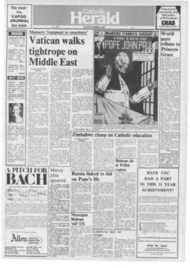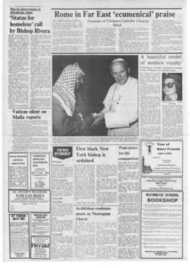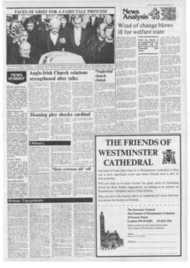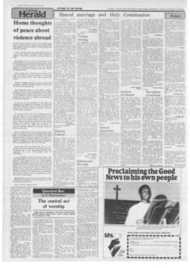Page 5, 24th September 1982
Page 5

Report an error
Noticed an error on this page?If you've noticed an error in this article please click here to report it.
Tags
Share
Related articles
S Further Study On Salvation This Week The Congregation For
Burying The Hatchet In The Arcic Final Report
How Arcic Sees The Place Of The Pope
A Year Of Unity And Division
Milestone On The Path To Reunion
No more 'no Popery'?
THE RAISING, earlier this year, of the diplomatic status of official relations between London and the Vatican and the publishing of ARCIC's final report, entitled Authority in the Church II, were curtain-raisers to a highly successful papal visit making this, as far as Great Britain has been concerned, very much "the year of the Pope."
And yet, until comparatively recently, some English Catholics were still being heard to mutter, from time to time, that the cry of "no Popery" was still to be heard in our midst. How and when did the tide begin, slowly but surely, to turn?
It was with the outbreak of the First World War that the British Foreign Office decided to break some important ice. The Foreign Secretary of the day, Sir Edward Gray, deemed it expediant at that time to send a British envoy on .a special mission to the Holy See. That office, in the event, remained on for the duration of the war and has never since been withdrawn. Our first Minister in Rome was Sir Henry Howard.
The overt initial purpose of the mission was to congratulate Pope Benedict XV on his election; but the true purpose was more political.
In the absence of any British representatives at the Vatican, the German and Austrian representatives had enjoyed too strong an advantage in explaining their cause as to the war; and it was judged necessary that Britain should justify her motives compelling her to intervene, and that the British government should acquaint the Holy Father of their attitude towards many questions arising therefrom.
Grey wrote to our ambassador in Rome, Sir R. Rodd (later Baron Rennell of Rodd), on November 20, 1914: "Our information was that the Prussian representative at the Vatican and the Austrian representative were doing all in their power to influence the clerical press in Italy and in Spain, and even in the world generally. There was a regular campaign to capture public opinion; neither England nor France was represented at the Vatican; and it was intolerable that the organised and unscrupulous attempts to influence opinion at the Vatican should continue uncontradicted. We wish, therefore, to send a special mission, so that our view and the truth might be known."
The reaction in Britain to
these events is, at least to our knowledge now, astonishing. There is a file (FO 371.2007) in the Public Record Office entitled: Protests by Protestant Organisations and Individuals.
Protests were sent to the Foreign Office by the officers of The Protestant Alliance, The Men's Protestant Union, The Protestant Truth Society, The Loyal Orange Institution bf England (Orange Princess Women's Associate Lodge), The London Council of United Protestant Societies, The London Central Young Men's Christian Association, The Metropolitan Association of Strict Baptist Churches, The Primitive Methodist Church (Leeds District), The National Protestant League (Shrewsbury Lodge); and in Scotland, The Protestant Institute of Scotland, The Grand Orange Lodge (Glasgow), the Knox Club (Edinburgh) and The Original Secession Manse.
Many private letters came to the Foreign Office, several of them duly and politely answered, and several marked "not to be acknowledged"; while a minute continues —
"Some 30 other protest from various bodies were received similar to the first part of this file.They have been destroyed."
It might be well to follow
through one set of correspondence, to show the flavour for others. On December 2, 1914, Henry Fowler, Secretary of the Protestant Alliance, wrote to Sir Edward Grey, the Foreign Secretary, quoting the Messagero, a Rome newspaper: he asked for confirmation of 'Signor Howard' as appointed to the Vatican, and added — "My committee submit that such action of the Government, if true, is a direct insult to the King of Italy, the only rightful ruler in Rome. The temporal powers of the Pope have been overthrown and any action of the British Government (to re-establish theft) is to be deplored."
To this the Foreign Secretary replied on December 16 with details of affirmation, adding: "It is well understood that missions, either permanent or temporary, to the Pope, do not run counter to the Law of Guarantees and have always been admitted without question by the Italian Government."
But before this letter had been received, The Protestant Alliance had fired off its second salvo, on December 15, again to the Foreign Secretary. "The Papacy never has been and is not now the friend of England; but far, very far the other way, in contradiction of all and every utterance of any and everybody to the contrary. Since the year 1870 the Pope has ceased to be the 'Sovereign of the Roman States', and by the Italian plebiscite of 2nd October, in the same year the title was transferred to Victor Emmanuel, the then King of Italy."
Secretary Fowler of The Protestant Alliance followed this up by writing to the Foreign Secretary on January 4, 1915, quoting with contempt the Catholic Herald, whose article on the previous December 19 had stated: "It must be rather humiliating to the extreme for rabid ultra-Protestants to find that, so many years after the seizure of the Papal States by Italy, the position of the Pope in Europe is looked upon by statesmen of all countries as of such vast importance, and a
good understanding with the Vatican as something which is necessary to any important Government, anxious to do its best in the interests of its country and its people . . . It is necessary to secure the head of the Catholic Church full and perfect freedom to discharge the duties of his sacred office free from the interference or control of any authority whatever, still less the authority of the present Kingdom of Italy, which has shown itself the intolerant and rapacious foe of the Holy See." (This is strange language to our ears today; but then, the hubris and venom of all inter-religious language is of the past and, on the whole, not of our time.
Secretary Fowler's next quotation underlines that judgment; for he quotes similar language from the Tablet of September 19, 1846, four years before the re-establishment of the Catholic hierarchy in England and Wales. "The Pope will speak more loudly than ever; and, what is more, he will turn over your musty Acts of Parliament with finger and thumb, scrutinising them with a most irreverent audacity;
examining those which concern him, and when he has found these, rejecting some and `tolerating' others, with as much freedom as you use when you handle oranges in a shop, selecting the soft and the sweet, contemptuously rejecting the sour and rotten . . . The Queen wills it; the Lords will it; the Commons will it . . . You may call it Law if you please. You may enter it on your roll. You may print it in the yearly volume of your Statutes. But before long you will have to repeal or alter it in order to procure the sanction of a foreign Potentate, without which it has not, in the end, the value of a tenpenny nail."
Surely that is hardly the best language for a Christian body seeking goodwill in the land of an established religion, which had only recently conceded emancipation.
The rest of the correspondence continued in that regrettable vein, which bore no good will either to Rome or to the Foreign Office in its endeavours to build a relationship with the Vatican a relationship which in the event has proved providentially fruitful for all concerned.
Alas, that Protestant correspondence was not uncharacteristic of the whole from such a quarter.
One might cite, for instance, an Address to His Majesty the King submitted on December 23, 1914 by way of the Home Secretary (Rt Hon Sir Reginald McKenna) from the President and Secretary of The Protestant Truth Society: "We your Majesty's most loyal subjects". They suggested that the appointment of Sir Henry Howard to the Holy See had offended the United Kingdom electorate, the overseas Dominions, the Italian nation, the anti-clerical element of France, the Czarist Russians, and European politics in general.
In short, "it is altogether inconsistent with national welfare to•parley with the system of Romanism; all nations coquetting with Romanism as a political power have suffered grievous upheavals; the political intrigues of Romanism may be charged as an underlying cause of the present War."
The principal charge, as to the last point, was that the Vatican courted Germany and Austria as the best hope for Catholicism in contemporary European politics.
"The declared hope by Romish Ecclesiastics (is) that a European conflict would open the way for Austria to restore again the Temporal Power of the Pope." So it goes on; until it comes to an end with an invocation of some not unfamiliar words from the economist, Adam Smith: "The Church ok Rome is the most formidable combination that ever was formed against the authority and security of civil government as well as against the liberty, reason and happiness of mankind." (One hears an echo of the voice of Thomas Hobbs there).
All this occurred in the lifetime of our own fathers; and there are men alive to remember it today. We have travelled far from such prejudice, such unreason and such ingrained ill will. We have come sincerely and unconditionally to seek the truth; and to want to share it; both the search and the discovery.
But the marks of prejudice take more than one lifetime to be erased. Where there is death, there is hope.
blog comments powered by Disqus









